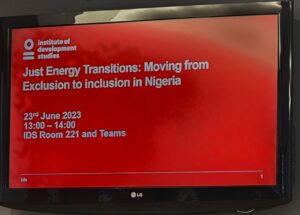Spaces for Change |S4C shared its research findings on energy transition in Nigeria with academics, postgraduate students, and independent energy experts at the UK’s Institute of Development Studies in Brighton, United Kingdom. Against the backdrop of Nigeria’s commitment to net-zero emissions by 2060, S4C’s research, ENERGY TRANSITION IN NIGERIA’S OIL RICH COMMUNITIES, examines what a just transition would look like for resource-rich communities in the oil and gas-producing regions in Nigeria. It also probed the alternatives placed before communities and non-state actors whose livelihoods are dependent on fossil fuel extraction and local refining.
There seems to be a global consensus for countries around the world to leapfrog to renewable energy in order to contain carbon emissions responsible for global warming. For that reason, countries, including Nigeria, have committed to cutting carbon emissions by phasing out the use of fossil fuels. The Niger-Delta region remains the focal point when it comes to fossil fuel (oil) exploration in Nigeria, with vast swathes of the local environment brutally ravaged by decades of fossil fuel extraction. Not only that, widespread poverty and unemployment have driven large numbers of people, including women in the region into artisanal refining, popularly known as kpo-fire business. The illegal trade has created massive employment opportunities for local populations.
Should energy transitions succeed, what alternatives are placed before communities and non-state actors whose livelihoods are dependent on crude oil extraction and local refining? Nigeria’s Energy Transition Plan (ETP), released in August 2022, developed as a pathway toward realizing the country’s climate target adopts natural gas as Nigeria’s transition fuel to aid the process of phasing out carbon-polluting fuels like crude oil. Meeting this target will put an end to Nigeria’s historical dependence on crude oil. However, the ETP is silent on communities and pretends that informal crude oil refining does not exist. While the national energy transition policy highlights a litany of potential benefits to citizens, it neither makes any specific reference to, nor provision for oil- and gas-dependent communities that will be significantly affected by phasing out fossil fuels.
S4C’s research surveyed the opinions of indigenous communities across 3 oil-rich states in the Niger Delta region of Nigeria – Imo, Bayelsa, and Rivers. All the surveyed communities have been heavily impacted by the social, financial, and environmental effects of oil exploration and extraction. Key informant interviews and focus group discussions were conducted among traditional rulers, artisanal refiners, youth leaders, women, and men. The research found that policy responses to energy transition have for the most part, been driven by governments and corporations, limiting opportunities to better understand how oil-rich communities, including those dependent on artisanal refining for their livelihoods perceive ‘just energy transitions’: whether or not they support it, and how to engage and facilitate their inclusion in national, regional and global transition plans.
Across all the communities surveyed, there was unanimous demand for restorative justice. Communities are asking who will clean up the environment after fossil fuels have been abandoned and corporations have gone back to their countries. Local communities are asking who will control the wealth accruing from renewable resources under a green economy. Local communities are asking what will happen to local livelihoods that are now intertwined with the extraction of fossil mineral resources. Communities are asking whether dependencies, including subsidies, on imported energy products will persist or will be eradicated under a low-carbon economy. Installing and distributing off-grid power and renewable energy infrastructure is not cheap and often far beyond the reach of the common man. Communities are asking how they will overcome the existing limitations on access to capital and cleaner energy solutions. The questions are legion.
S4C’s research established that national transition plans and policies neither made arrangements for cleanup, remediation, compensation, and rehabilitation for host and impacted communities nor for addressing the massive environmental damage that has accompanied the country’s protracted dependence on fossil fuels. Significant gaps further exist between the climate change commitments of the country and the policies put in place to foster energy transition in Nigeria.
The debate and discussions that ensued after the presentation explored how to increase opportunities for local voices and participation in the renewable revolution as an alternative to artisanal refining along with all the attendant pollution and harm. Though it will not be easy, there were suggestions for communities to explore feasible (both technical and political) routes. One option worth exploring is the idea of community-owned cooperatives launching their own renewable products and services. They could partner with experienced technical partners and then use their own land to build solar farms and use some of the electricity for themselves exporting the rest to the grid. Without the creation of alternative livelihoods, sadly, artisanal refining will continue. Another clear finding is that while the world clamors for an urgent shift to a low-carbon future, the needs and priorities of different contexts vary. And that variance in the contextual needs and priorities in different jurisdictions should inform how, why, and when to transit.





















